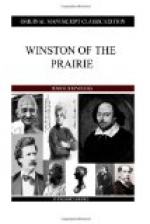Maud Barrington regarded him steadily, and the smile died out of her eyes. “But,” she said slowly, “is all that quite beyond realization. Could you not bring it about?”
Winston saw her quiet confidence and something of her pride. There was no avarice in this woman, but the slight dilation of the nostrils and the glow in her eyes told of ambition, and for a moment his soul was not his own.
“I could,” he said, and Maud Barrington, who watched the swift straightening of his shoulders and lifting of his head, felt that he spoke no more than the truth. Then with a sudden access of bitterness, “But I never will.”
“Why?” she asked, “Have you grown tired of Silverdale, or has what you pictured no charm for you?”
Winston leaned, as it were wearily, against the wheel of the mower. “I wonder if you could understand what my life has been. The crushing poverty that rendered every effort useless from the beginning, the wounds that come from using imperfect tools, and the numb hopelessness that follows repeated failure. They are tolerably hard to bear alone, but it is more difficult to make the best of them when the poorly-fed body is as worn out as the mind. To stay here would be—paradise—but a glimpse of it will probably have to suffice. Its gates are well guarded, and without are the dogs, you know.”
Something in Maud Barrington thrilled in answer to the faint hoarseness in Winston’s voice, and she did not resent it. She was a woman with all her sex’s instinctive response to passion and emotion, though as yet the primitive impulses that stir the hearts of men had been covered if not wholly hidden from her by the thin veneer of civilization. Now, at least, she felt in touch with them, and for a moment she looked at the man with a daring that matched his own shining in her eyes.
“And you fear the angel with the sword?” she said. “There is nothing so terrible at Silverdale.”
“No,” said Winston. “I think it is the load I have to carry I fear the most.”
For the moment Maud Barrington had flung off the bonds of conventionality. “Lance,” she said, “you have proved your right to stay at Silverdale, and would not what you are doing now cover a great deal in the past?”
Winston smiled wryly. “It is the present that is difficult,” he said. “Can a man be pardoned and retain the offense?”
He saw the faint bewilderment in the girl’s face give place to the resentment of frankness unreturned and with a little shake of his shoulders shrank into himself. Maud Barrington, who understood it, once more put on the becoming reticence of Silverdale.
“We are getting beyond our depth, and it is very hot,” she said. “You have all this hay to cut!”
Winston laughed as he bent over the mower’s knife. “Yes,” he said, “It is really more in my line, and I have kept you in the sun too long.”
In another few moments Maud Barrington was riding across the prairie, but when the rattle of the machine rose from the sloo behind her, she laughed curiously.




